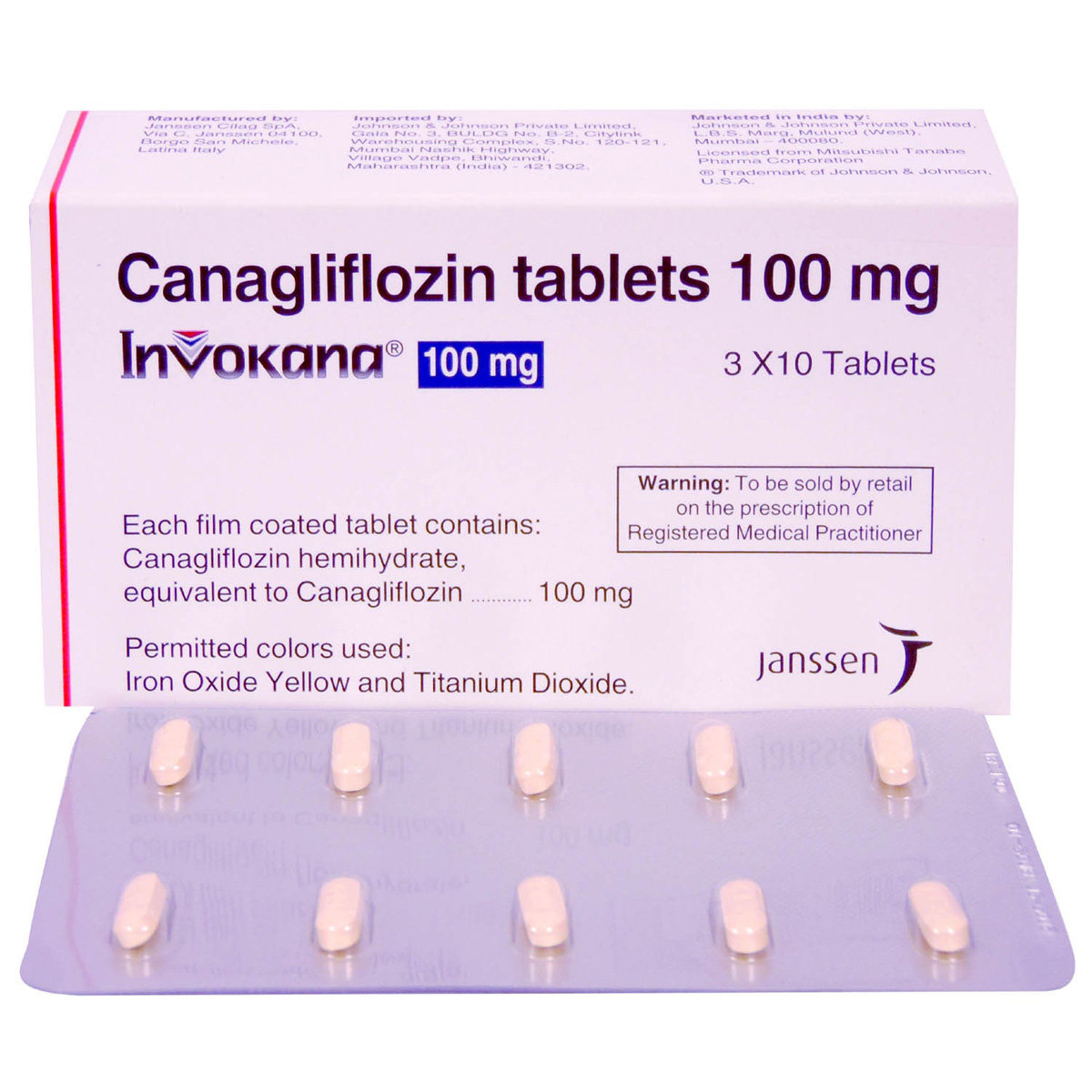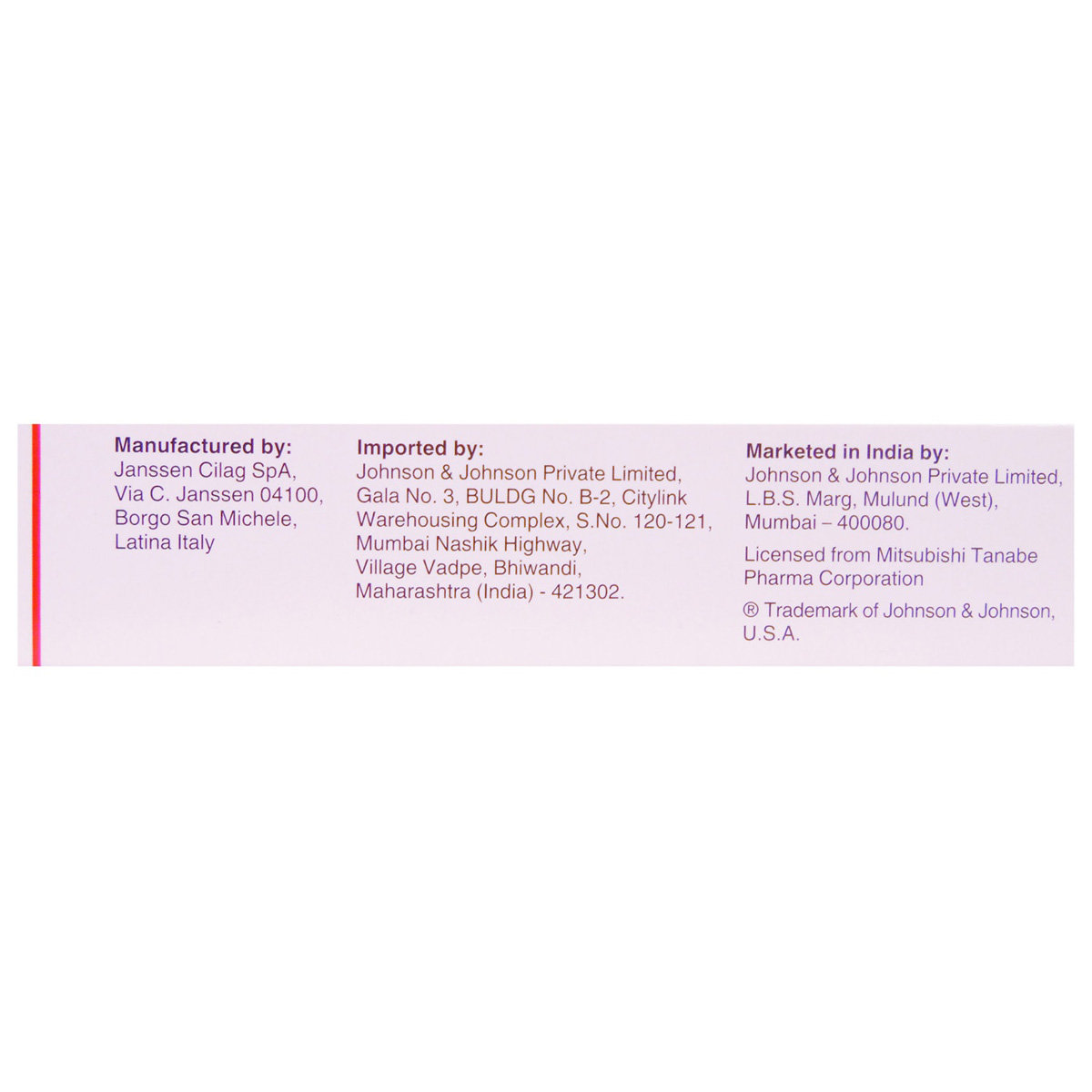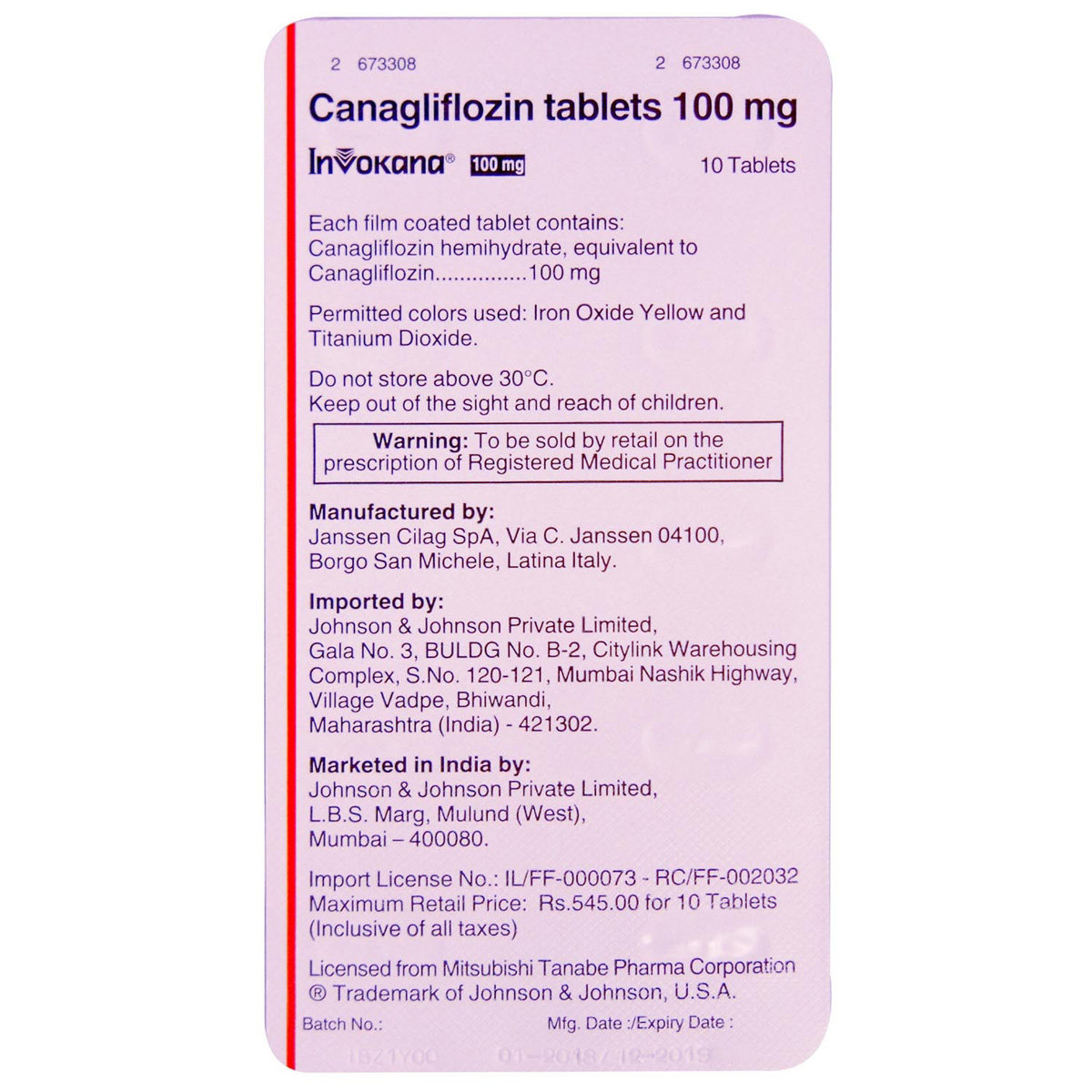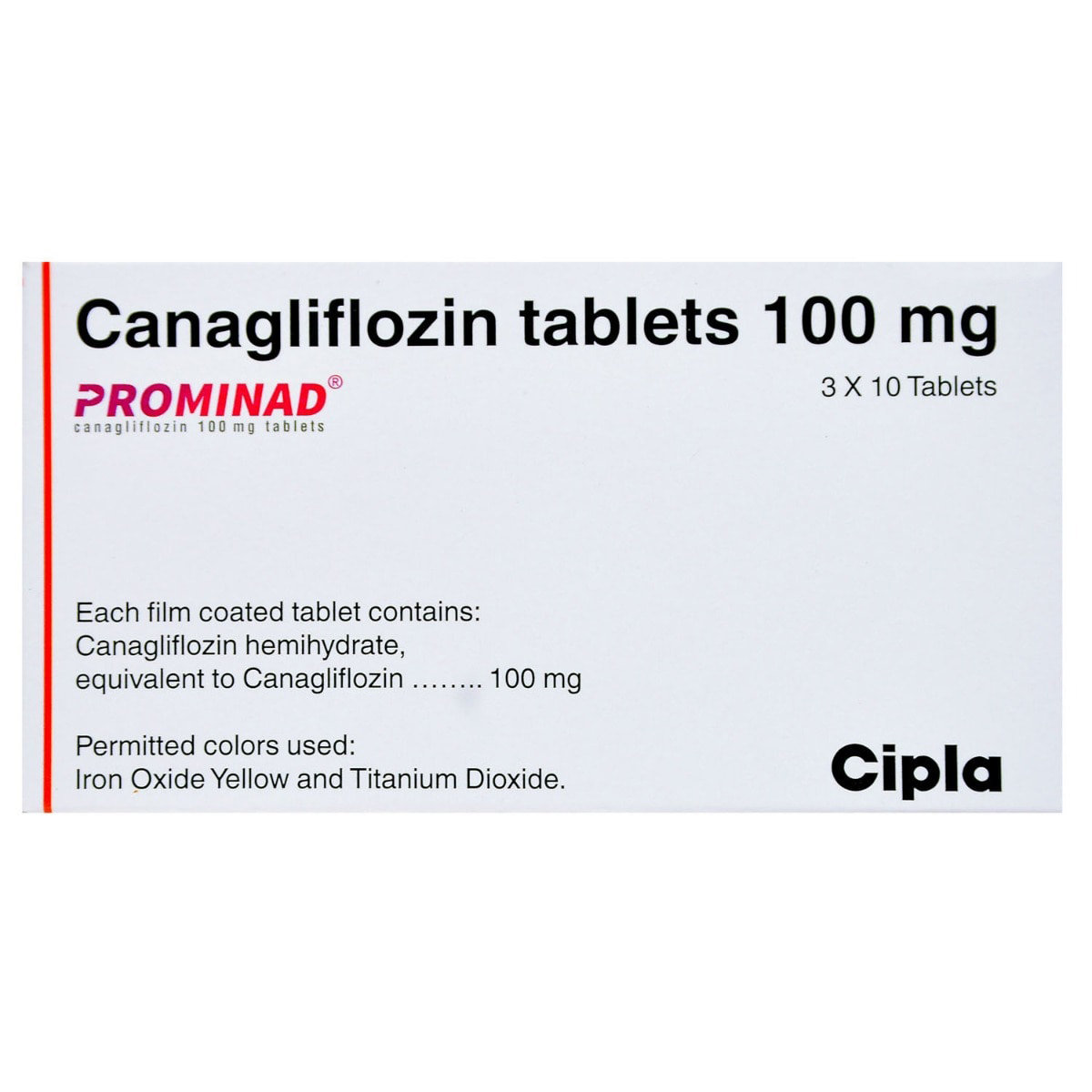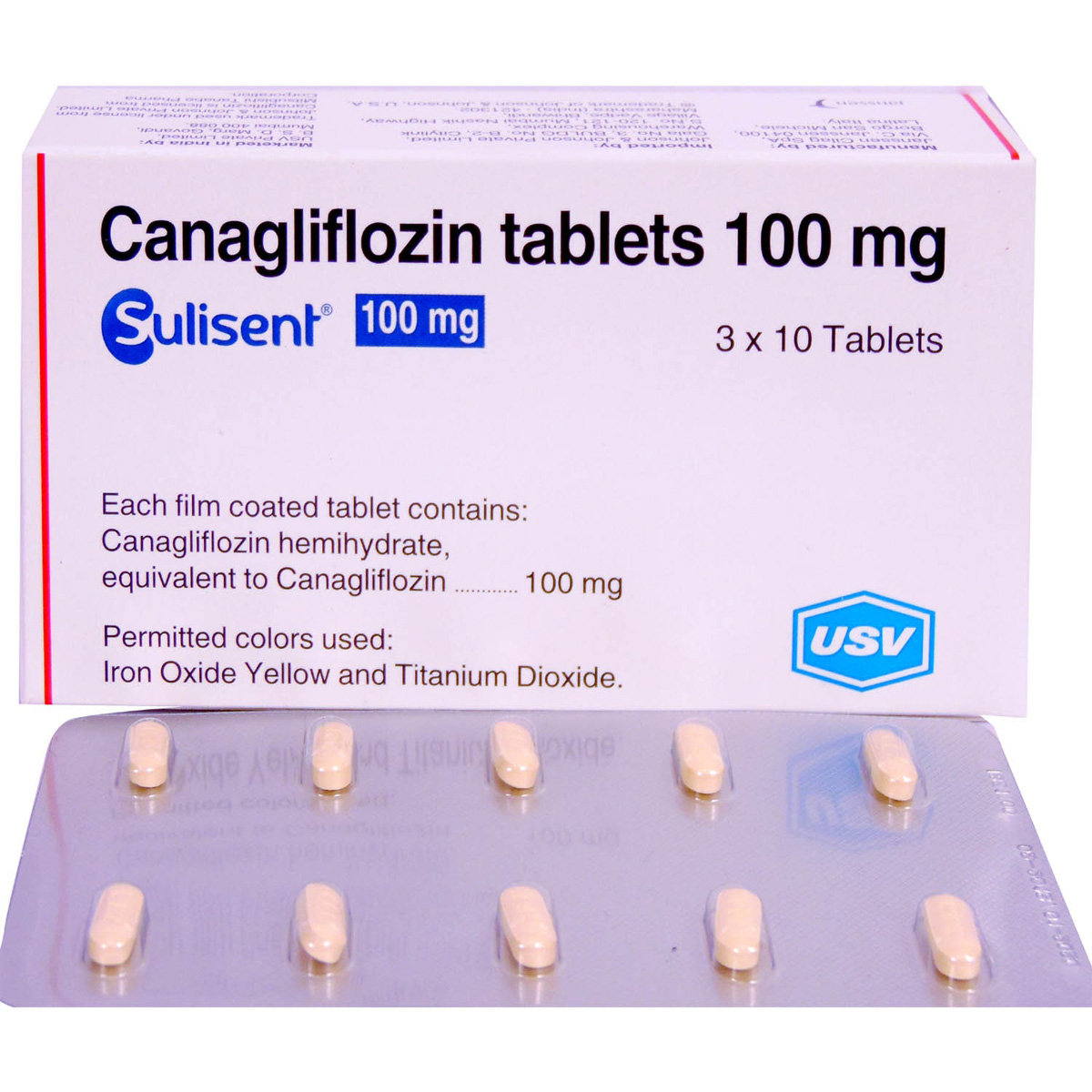Invokana 100 mg Tablet 10's
MRP ₹553
(Inclusive of all Taxes)
₹83.0 Cashback (15%)
Provide Delivery Location
Online payment accepted
 Prescription drug
Prescription drugWhats That
Composition :
Manufacturer/Marketer :
Consume Type :
Expires on or after :
Return Policy :
About Invokana 100 mg Tablet
Invokana 100 mg Tablet belongs to the category of medicines called 'anti-diabetic' primarily used for managing and treating type 2 diabetes, especially in persons whose sugar levels are too high and cannot be controlled only by dieting and exercising. Type 2 diabetes is a condition that occurs when there is either less insulin or available insulin is not properly utilized by our body cells for lowering raised blood glucose. It is the most common type of diabetes, accounting for around 90% of diabetes cases found commonly in middle-aged people. So it is also called adult-onset diabetes or non-insulin-dependent diabetes mellitus (NIDDM).
Invokana 100 mg Tablet contains “Canagliflozin” is a sodium-glucose cotransporters-2 (SGLT-2) (a protein present in the kidney) inhibitor that works by inhibiting the reabsorption of glucose in the body, resulting in an increase in glucose excretion through urine. The removal of excessive glucose helps to lower the blood sugar level. Additionally, it also lowers high blood pressure, due to increased diuretic effect (water loss) and reduced body weight due to a reduction in glucose availability.
Take Invokana 100 mg Tablet as prescribed. Your doctor will advise you how often you take Invokana 100 mg Tablet based on your medical condition. In some cases, you may experience urinary tract infections, changes in urination (including urinating more frequently or in larger amounts, urgent need to urinate, need to urinate at night), constipation, feeling thirsty, nausea, dizziness, and nausea. Most of these side effects of Invokana 100 mg Tablet do not require medical attention and gradually resolve over time. However, if the side effects are persistent, reach out to your doctor.
Before starting Invokana 100 mg Tablet , let your doctor know if you are pregnant or planning to get pregnant, or breastfeeding. And also, tell the doctor if you have/had any medical history of heart, liver, or kidney diseases. Inform your doctor about all the medicine you are taking and your health condition to rule out any unpleasant side effects. Invokana 100 mg Tablet works best when coupled with a healthy lifestyle like losing weight if you are overweight (BMI>25), eating fewer calories (low fat and sugary food), and being more physically active (at least 150min of activity every week).
Uses of Invokana 100 mg Tablet
Directions for Use
Key Benefits
Invokana 100 mg Tablet belongs to the group of medicines called “anti-diabetic” indicated in the treatment of type 2 diabetes or non-insulin-dependent diabetes (NIDDM). This medicine is primarily prescribed to persons with high blood sugar levels and is not controlled by diet and exercise alone. Invokana 100 mg Tablet consists of “Canagliflozin” is a sodium-glucose cotransporter-2 (SGLT-2) inhibitor responsible for the inhibition of SGLT-2 enzymes in the kidney. It prevents the reabsorption of glucose from the blood filtered through your kidney, thereby increasing the glucose excretion from your body when you pee. In some cases, Invokana 100 mg Tablet can cause weight loss in diabetic persons by increasing the excretion of excess sugar through urination when you pee.
Storage
- Inform your doctor about your constipation symptoms. They may adjust your medication or advise alternative treatments.
- Stay hydrated by drinking sufficient of water (at least 8-10 glasses a day) to help soften stool and promote bowel movements.
- Increase fibre intake by eating foods high in fibre, such as fruits, whole grains, vegetables and legumes, to help bulk up the stool.
- Establish a bowel routine by trying to go to the bathroom at the same time each day to train your bowels.
- Engaging in regular exercise, like walking or yoga, can support in bowel movement stimulation.
- Consult your doctor if constipation persists, and discuss alternative treatments or adjustments to your medication.
- Inform your doctor about the nausea and discuss possible alternatives to the medication or adjustments to the dosage.
- Divide your daily food intake into smaller, more frequent meals to reduce nausea.
- Opt for bland, easily digestible foods like crackers, toast, plain rice, bananas, and applesauce.
- Avoid certain foods that can trigger nausea, such as fatty, greasy, spicy, and smelly foods.
- Drink plenty of fluids, such as water, clear broth, or electrolyte-rich beverages like coconut water or sports drinks.
- Use ginger (tea, ale, or candies) to help relieve nausea.
- Get adequate rest and also avoid strenuous activities that can worsen nausea.
- Talk to your doctor about taking anti-nausea medication if your nausea is severe.
- Record when your nausea occurs, what triggers it, and what provides relief to help you identify patterns and manage your symptoms more effectively.
- Drink six to eight glasses of water per day to be healthy.
- Healthy urinary habits can help minimize pollakiuria (frequent urinating).
- Avoid liquids containing caffeine, artificial sweeteners, and soda, as they might cause bladder discomfort.
- Add bladder-friendly foods such as omega-3 fatty acids, blueberries, and cranberries.
- Inform your doctor about the medication you're taking and the UTI symptoms you're experiencing.
- Your doctor may adjust your medication regimen or consider alternative medications or dosages that may reduce the risk of UTIs.
- Drink plenty of water (at least 8-10 glasses a day) to help flush out bacteria. Avoid sugary drinks and caffeine, which can exacerbate UTI symptoms.
- Urinate when you feel the need rather than holding it in. This can help prevent bacterial growth and reduce the risk of UTIs.
- Consider cranberry supplements: Cranberry supplements may help prevent UTIs by preventing bacterial adhesion.
- Monitor UTI symptoms and report any changes to your doctor.
- If antibiotics are prescribed, take them as directed and complete the full course.
- High sugar intake can promote yeast growth, which is a common cause of balanoposthitis. Reduce consumption of sugary drinks, processed foods, and excessive sweets.
- A well-balanced diet rich in fruits, vegetables, whole grains, and lean protein supports overall health and immune function, which can help prevent infections.
- Staying well-hydrated is important for overall health and may help prevent balanoposthitis by keeping the urinary tract healthy.
- Take warm water sitz baths, use saline baths, and use over-the-counter talcum powders.
- Thoroughly dry the area after washing.
- Avoid harsh soaps, detergents, and scented products in the genital area.
- Use topical antifungal agents like bacitracin.
- Eat a balanced diet rich in fruits, vegetables, and whole grains to support overall health.
- Incorporate probiotic-rich foods like yogurt or kefir into your diet to promote gut health.
- Practice good genital hygiene by washing with warm water and avoiding harsh soaps.
- Wear loose, breathable cotton underwear to reduce moisture buildup.
- Avoid douching and scented soaps that can disrupt natural vaginal balance.
- Stay dry and change out of wet clothes promptly to prevent yeast growth.
- Limit excessive sugar consumption to reduce yeast growth.
- Consider adding antifungal foods like garlic or turmeric to your diet.
- Reduce stress levels by practicing calming techniques such as mindfulness, meditation, or controlled breathing exercises.
- Complete the full course of prescribed antifungal treatment to prevent recurrence.
- Consult your doctor if you experience frequent or severe yeast infections.
Drug Warnings
Invokana 100 mg Tablet should not be used in patients with type 1 diabetes or diabetic ketoacidosis. Before you start taking Invokana 100 mg Tablet , tell your doctor if you have serious heart disease or if you have had a stroke, low blood pressure (hypotension), and severe liver or kidney disease. Invokana 100 mg Tablet , when used with insulin, $ name may lower the blood sugar level, leading to hypoglycemia, which can be fatal. Your doctor may adjust the dose by lowering the dose of insulin or Invokana 100 mg Tablet in this case. If you experience rapid weight loss, feeling sick or being sick, stomach pain, excessive thirst, fast and deep breathing, confusion, unusual sleepiness or tiredness, a sweet smell to your breath, a sweet or metallic taste in your mouth, or a different odour to your urine or sweat, talk to a doctor or go to the nearest hospital immediately.
Drug-Drug Interactions
Drug-Drug Interactions
Login/Sign Up
Co-administration of Invokana 100 mg Tablet with Gatifloxacin may affect blood glucose levels. Both low blood glucose and, less frequently, high blood glucose have been reported.
How to manage the interaction:
Although there is a possible interaction, Invokana 100 mg Tablet can be taken with Gatifloxacin if prescribed by the doctor. Consult the prescriber if you experience symptoms such as nervousness, confusion, headache, dizziness, drowsiness, tremors, nausea, hunger, weakness, perspiration, palpitation, rapid heartbeat, increased urination, increased thirst, and increased hunger. Maintaining blood glucose levels is advised. Do not discontinue the medication without consulting a doctor.
Co-administration of Morphine with Invokana 100 mg Tablet may increase the blood levels and side effects of morphine.
How to manage the interaction:
Co-administration of Morphine with Invokana 100 mg Tablet can result in an interaction, but it can be taken if a doctor has advised it. However, if you experience any symptoms like trouble breathing, feeling tired, or having a cough, dizziness, drowsiness, difficulty concentrating, impaired judgment, reaction speed, and motor coordination, make sure to contact a doctor immediately. Do not stop using any medications without consulting a doctor.
Drug-Food Interactions
Drug-Food Interactions
Login/Sign Up
Diet & Lifestyle Advise
- A person should engage themself in regular exercise like cycling, running, walking, jogging, dancing, or swimming for at least 30 minutes. Try to invest at least 150 minutes weekly in exercise.
- A person should also maintain a healthy body weight to avoid obesity or high blood sugar; it can increase the risk of the onset of diabetes.
- A person should take low fat and a low sugar diet. For that, replace carbohydrates with whole grains, fruits, and vegetables as carbohydrates changed into sugars leading to high blood sugar levels.
- Try to avoid potatoes as they are high glycaemic foods that increase the risk of high sugar in the blood.
- A person should limit the consumption of alcohol and quit smoking.
- Keep your blood pressure as normal (120/80) as possible, as it reduces the risk of cardiovascular diseases in diabetes patients.
- Do not take stress as it may elevate your blood sugar level. You can adopt stress management techniques like mindfulness to control stress-related blood sugar changes.
Side Effects of Invokana 100 mg Tablet
- Urinary tract infections
- Changes in urination (including urinating more frequently or in larger amounts, urgent need to urinate, need to urinate at night)
- Constipation
- Feeling thirsty
- Nausea
- Blood tests may show changes in blood fat (cholesterol) levels
- Increases in the number of red blood cells in your blood
Habit Forming
Therapeutic Class
All Substitutes & Brand Comparisons
RX
Prominad Tablet 10's
Cipla Ltd
₹556.5
(₹48.97 per unit)
11% CHEAPERRX
Sulisent 100 mg Tablet 10's
USV Pvt Ltd
₹611
(₹53.77 per unit)
2% CHEAPERRX
Out of StockCanagliflozin 100 Tablet 10's
Elder Projects Ltd
₹609
(₹60.9 per unit)
10% COSTLIER
Author Details
We provide you with authentic, trustworthy and relevant information
Drug-Diseases Interactions
Drug-Diseases Interactions
Login/Sign Up
Due to a lack of clinical data, the SGLT2 inhibitors ertugliflozin and Invokana 100 mg Tablet are not advised for use in patients with severe hepatic impairment. It is advised to exercise caution when using dapagliflozin in patients with severe hepatic impairment. Patients with mild or moderate hepatic impairment do not require dosage modifications.
How to manage the interaction:
Invokana 100 mg Tablet is not recommended for use in patients with severe hepatic impairment due to a lack of clinical data.
In patients with deteriorating renal function, the glucose-lowering benefits of sodium-glucose cotransporter 2 (SGLT2) inhibitors are reduced. In addition, those who have impaired renal function (eGFR less than 60 mL/min/1.73 m2), those who are elderly, and those on loop diuretics may be more susceptible to deleterious effects of volume depletion like hypotension and acute kidney injury.
How to manage the interaction:
The glucose-lowering effects of the medicine may be decreased in patients with worsening kidney function. Renal function should be evaluated prior to treatment initiation and monitored regularly in at-risk patients.
Sodium-glucose cotransporter 2 (SGLT-2) inhibitors cause intravascular volume contraction which may lead to symptomatic hypotension after treatment initiation especially in the elderly, in patients with impaired renal function, patients with low systolic blood pressure, or those using diuretics . Volume status should be assessed and corrected before starting treatment and patients should be monitored during therapy.
How to manage the interaction:
Low blood pressure might occur in patients with impaired renal function, patients with low systolic blood pressure, or those using diuretics. Patients should be monitored during therapy.
The usage of sodium-glucose cotransporter 2 (SGLT-2) inhibitors has been linked to an increased risk of genital mycotic infections. When administering this medication to patients who have a history of genital mycotic infections or who have not undergone circumcision, caution should be taken because they are more susceptible to experience genital mycotic infections. Observe and treat as necessary.
How to manage the interaction:
Genital mycotic infections may occur. Care should be exercised in patients who have a history of genital mycotic infections or who are uncircumcised as these patients are more likely to develop genital mycotic infections. Monitoring the patient for infections is advised.
FAQs
Drug-Drug Interactions Checker List
- GLIMEPIRIDE
- GLIPIZIDE
- FUROSEMIDE
- CARBAMAZEPINE
- PHENYTOIN
- PHENOBARBITAL
- EFAVIRENZ
- RITONAVIR
- RIFAMPICIN
- CHOLESTYRAMINE
- DABIGATRAN
- DIGOXIN
Special Advise
You should have a test of glycated haemoglobin (HbA1C) every 3 months to check your blood glucose level control.
Disease/Condition Glossary
Type 2 diabetes: It is a chronic or lifelong condition in which the body's cells fail to respond to insulin and, in later stages, the body fails to produce enough insulin. It accounts for roughly 90% of all diabetes cases. Because of this condition, the body must rely on various energy sources in muscles, tissues, and organs. Early symptoms of this disease include constant hunger, lack of energy, fatigue, weight loss, excessive thirst, frequent urination, dry mouth, itchy skin, and blurry vision. Type 2 diabetes, also known as adult-onset diabetes, is most common in people in their forties and fifties. The risks of uncontrolled type 2 diabetes include retinal damage or blindness, limb loss, nerve problems, kidney problems, sexual dysfunction, and an increased risk of heart attack or stroke.

Have a query?
Alcohol
Safe if prescribed
You should avoid consuming alcohol with Invokana 100 mg Tablet as it may alter your blood sugar levels or lead to serious side effects.
Pregnancy
Consult your doctor
No sufficient data are available on the use of Invokana 100 mg Tablet in pregnancy. Invokana 100 mg Tablet is a Category C pregnancy drug that is not recommended for use in pregnancy. Hence, consult your doctor before taking this medicine.
Breast Feeding
Consult your doctor
There is no sufficient data on how Invokana 100 mg Tablet affects breastfeeding. It is safe to seek medical advice before you start Invokana 100 mg Tablet if you are breastfeeding.
Driving
Safe if prescribed
Invokana 100 mg Tablet is safe to take before driving as it does not affect your thinking ability. Do not drive or operate machinery if you experience dizziness or drowsiness.
Liver
Consult your doctor
If you have liver disease or a history of liver impairment, consult your doctor before taking Invokana 100 mg Tablet . Your doctor may adjust the dose or prescribe a suitable alternative based on your condition.
Kidney
Consult your doctor
If you have kidney disease or a history of kidney impairment, consult your doctor before taking Invokana 100 mg Tablet . Your doctor may adjust the dose or prescribe a suitable alternative based on your condition.
Children
Safe if prescribed
Invokana 100 mg Tablet is not recommended for children below 18 years of age, as the safety and effectiveness were not established.
Recommended for a 30-day course: 3 Strips

